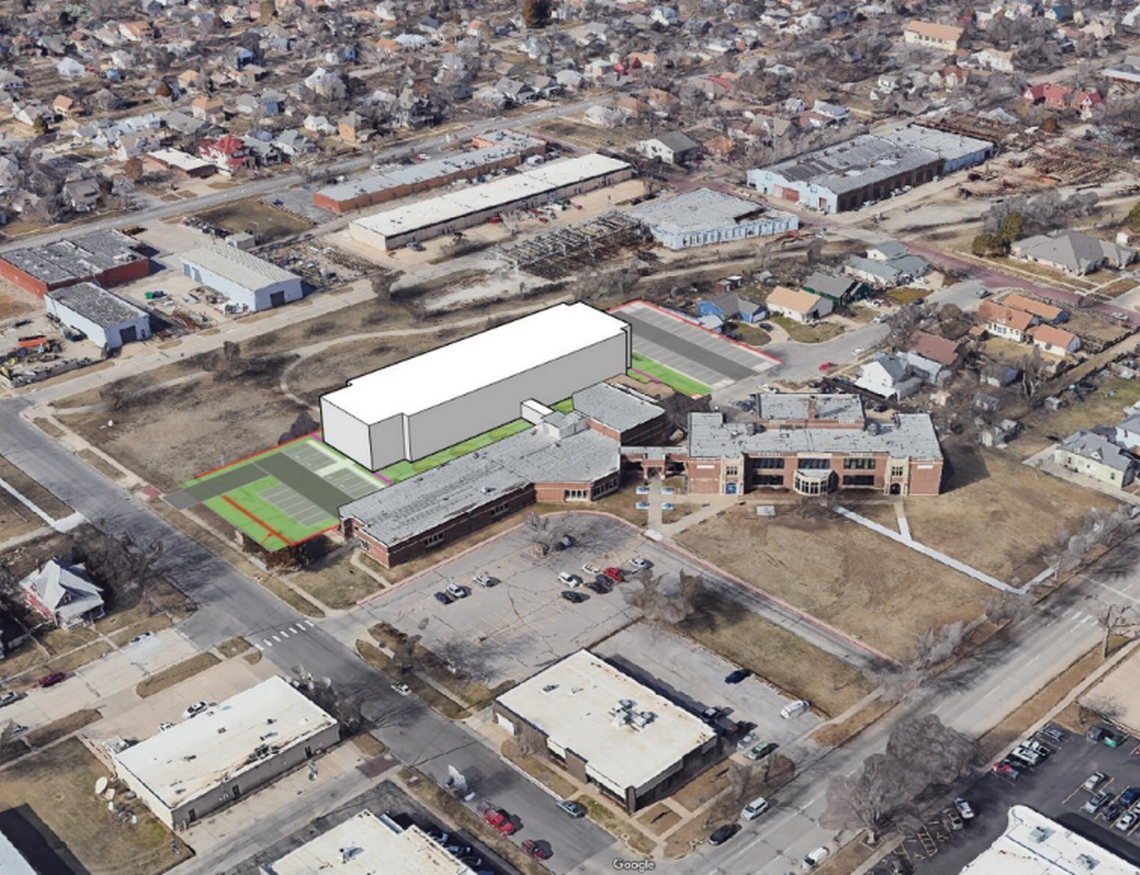What comes next as Wichita enters option agreement to buy Park Elementary for $1

The city of Wichita is one step closer to purchasing the former Park Elementary building in Historic Midtown and converting it into a homeless resources campus.
On Tuesday, the City Council approved an option agreement with Wichita Public Schools that gives the city six months to decide whether to purchase the recently shuttered school property for $1.
“Today’s action does not guarantee that we either are able to or want to acquire the building, right? This just gives us that opportunity to do that due diligence,” Assistant City Manager Troy Anderson told the council.
Over the next two months, city staff will be inspecting the property at 1025 N. Main, assessing the costs associated with necessary upgrades, and taking steps to ensure that if the City Council chooses to exercise its option and purchase the school, it will be ready to accommodate an emergency winter shelter by mid-November.
A preliminary estimate provided by City Manager Robert Layton last month is that the city will need to invest $8 million of capital into the property to transform it into the promised Multi-Agency Center (MAC), which will include congregate and non-congregate shelters, a navigation center for connecting people with resources and 50 affordable housing units on-site.
“I think this is a great solution,” said council member J.V. Johnston, a member of the homelessness task force. “It’s not a Taj Mahal solution. It’s temporary housing for people. We don’t want them living there forever. We want them living there until we can find them non-congregate housing and then eventually housing.”
He said the city’s homeless providers weren’t enthusiastic about the other leading site for the MAC, the former Riverside Hospital complex in West River Plaza, because it’s several miles from where many of their services are located in and around Midtown.
Purchasing the hospital alone would have cost just over $6 million, and the property would have also required extensive renovations. Although Park Elementary was most recently appraised at $750,000, officials say transferring the property between government agencies for a nominal fee of $1 is financially responsible.
“The building was originally paid for using taxpayer dollars, right?” Anderson said. “So using taxpayer dollars again to acquire the building would in essence place the burden of purchasing the property twice on taxpayer dollars.”
One-stop resource center
Vice Mayor Maggie Ballard, whose council district includes Historic Midtown, said helping people who are experiencing housing insecurity requires a hands-on approach.
“My work over the years has taught me that there isn’t a one-size-fits-all solution but what helps people is holding their hand while they navigate these complicated systems,” Ballard said. “The MAC creates the opportunity for someone who decides they need help to come to one place and be given a warm handoff to the specific resources that they need.”
Last month, city staff provided a rundown of wrap-around services that may be included in the MAC. They include an activity center, aging/disability services, bed bug treatment, clothing closet, computer lab, driver’s license/ID services, domestic violence/trafficking support, food pantry, meal provider (3 meals a day), hair cuts, housing providers, laundry, animal kennels, law enforcement/Homeless Outreach Team, legal services, mail room, medical/EMS services, mental health, quarantine room, showers, SNAP/DCF, SOAR (a program for connecting qualifying homeless residents with benefits), storage, substance abuse services, United Way, veteran services, veterinarian and workforce services.
If the transaction between the city and the school district goes through, the MAC could be fully equipped with wrap-around services by 2026.
“This Multi-Agency Center is supposed to be a one-stop location that will be not just a shelter but an opportunity for individuals to truly launch into better opportunities for themselves,” Mayor Lily Wu said. “Whether it’s help with healthcare, whether it’s help with job skills, whether it’s help to become an individual here in Wichita, that’s what the Multi-Agency Center is trying to be.”
Wichita’s no-camping ordinance
Not everyone the MAC is expected to serve will choose to seek help there. The Supreme Court’s ruling last week upholding municipalities’ ability to enforce anti-camping ordinances against homeless residents means police could relocate people to the facility who would have otherwise chosen to remain on the streets or in encampments.
Wu asked staff to prepare a presentation outlining the Wichita Police Department’s enforcement strategy of the no-camping ordinance and the city’s procedure for cleaning up encampments, which currently relies on independent contractors.
“I would like to see actual procedures so that it is clear what the Wichita Police Department can and cannot do based off of the SCOTUS ruling,” Wu said.


